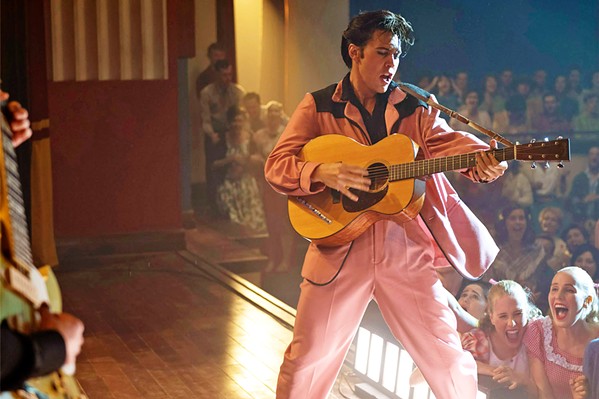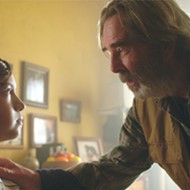Elvis is a visual and sonic feast
[{
"name": "Ad - Medium Rectangle CC01 - 300x250",
"id": "AdMediumRectangleCC01300x250",
"class": "inlineCenter",
"insertPoint": "8",
"component": "2963441",
"requiredCountToDisplay": "12"
},{
"name": "Ad - Medium Rectangle LC01 - 300x250",
"id": "AdMediumRectangleCC01300x250",
"class": "inlineCenter",
"insertPoint": "18",
"component": "2963441",
"requiredCountToDisplay": "22"
},{
"name": "Ad - Medium Rectangle LC09 - 300x250",
"id": "AdMediumRectangleLC09300x250",
"class": "inlineCenter",
"insertPoint": "28",
"component": "3252660",
"requiredCountToDisplay": "32"
}]
Co-writer/director Baz Luhrmann (Romeo + Juliet, Moulin Rouge!, Australia, The Great Gatsby) directs this biopic about famed rockstar Elvis Presley (Austin Butler) and his complicated relationships with manager Col. Tom Parker (Tom Hanks) and wife Priscilla (Olivia DeJonge). (159 min.)
Glen Luhrmann is a dazzling director with an eye for spectacle, and he creates a kaleidoscope of sights and sounds that is absolutely mesmerizing. The story begins in 1997 with Col. Parker on his deathbed looking back on his time with Elvis. We meet a young Elvis (Chaydon Jay) growing up in poverty with his parents Vernon (Richard Roxburgh) and Gladys (Helen Thomson), and we see how he's inspired by Black music—both the lurid juke joint style and the spirit-filled gospel of roadside tent revivals. It's a stirring precursor to this story about a sideshow conman who strikes gold discovering an ahead-of-his-time country bumpkin with a golden voice and a preternatural understanding of how to sell a song. Butler is positively magnetic in the role of Elvis and shares the performer's youthful looks and swagger. The music is, of course, fantastic, and I love how Elvis's music melds into a hip-hop soundtrack. Many believe Elvis exploited Black music akin to cultural appropriation, but as this story tells it, Elvis was steeped in Black music traditions and was part of its scene. He changed popular music as we know it. This is amazingly entertaining.
Anna Wowza, Luhrmann once again delivers a fantastical world on the big screen; this is just a total treat for the senses. While the storyline does stick with a lot of truths, Luhrmann takes artistic liberties with the way it winds together. Perhaps the villains are more villainous than they actually were and the saints more saintly, maybe Elvis's most peculiar traits and actions are ignored, but nonetheless we get a wonderful story—a wonderful tragedy. I give total props to Butler. This young actor has been on the small and big screen since he was a kid, but this role is going to launch him into a whole new level of roles. Luhrmann made the choice to use Butler's singing voice for the early years portrayed in the film and then blend his voice with Elvis's as the character got older, to match it with the real Elvis's voice in the years preceding his death at 42. This technique was a wonderful decision—I believed this character in the film and the voice we all know so well as one in the same.
Glen True, the broad strokes of the story are accurate, but don't go in thinking you're watching reality. This is a glossy, sparkling version of the tragic story. Elvis's talent supported his mother and father, his wife and child, his hangers on—the so-called Memphis Mafia—and apparently Col. Parker's insatiable gambling addiction. He had a huge weight on his back to keep the moolah rolling in. The film's central haunting questions are whether Elvis would be the superstar he became without Parker, and whether Parker's manipulation and control over Elvis's career ultimately hurt or helped him. His drug use and untimely death made Elvis a legend, but his music and songs such as "Unchained Melody," "Suspicious Minds," and "In the Ghetto" made him an indelible pop music icon. I'm thoroughly wowed by both Elvis's talent and this highly entertaining and emotionally resonant film.
Anna He wasn't just a voice. There was so much talent and a real sense of collaboration that made him the amazing star, showman, and musician that he was. The devil seems to catch up with mega talents, especially those who have substance abuse problems, and Elvis was no exception. I do appreciate that while we did see his decline and how his addictions and lifestyle changed the man himself, it wasn't the film's focus and didn't take up a lot of time. Despite its nearly 3-hour runtime, the film goes by in a flash, mainly focusing on how Elvis the man became Elvis: The King of Rock and Roll. Δ
Senior Staff Writer Glen Starkey and freelancer Anna Starkey write Split Screen. Comment at [email protected].







